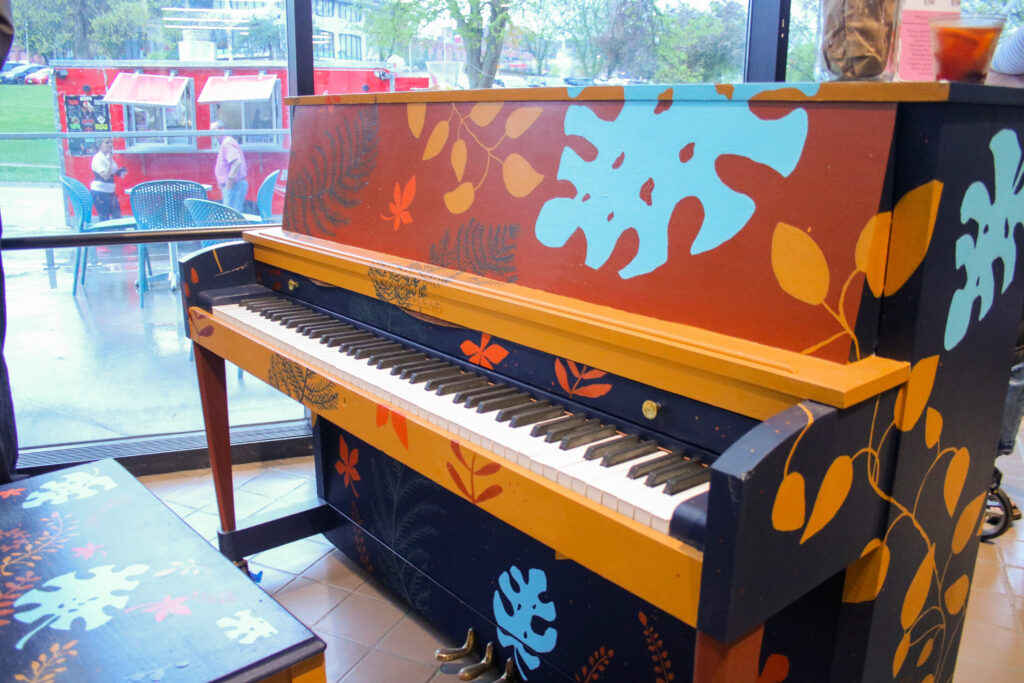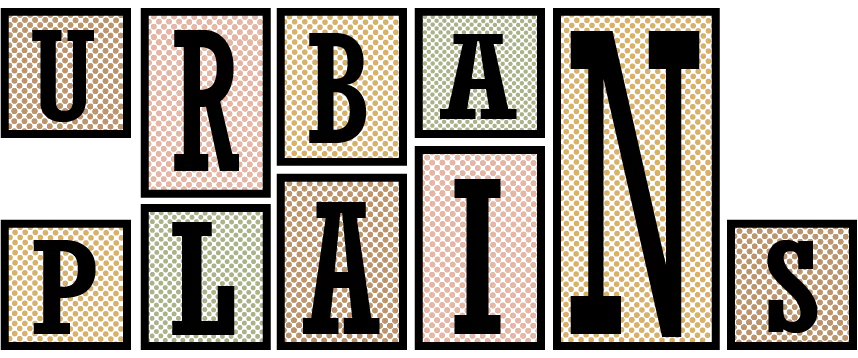In early May, Des Moines gets a little more musical. Colorfully painted pianos pop up around town. There’s one downtown at Cowles Commons. Another by the Des Moines River at local music venue and cyclist haven Captain Roy’s. Another at the conscience of the East Village, Raygun. Most neighborhoods in the city get a piano. Each one is painted by local artists.
It’s all the result of City Sounds Des Moines, a local nonprofit dedicated to spreading music across the city. They’ve been doing it for nearly a decade, starting with one piano in 2014. Monica Bollenbaugh, 2023 Board President, said the co-founders of the organization borrowed the public piano idea from friends in Iowa City, Tickle My Keys. The instruments are donated by community organizations and churches. But most pianos come from families who no longer use them. This year, City Sounds had over 100 people apply to donate pianos.
Not every instrument makes the cut, though. Once a piano is offered up, a piano technician makes a house call to test it out. They need to make sure it can last through the season—not an easy task for a instrument not designed to be outside and open to the elements. Generally, upright pianos work out the best. This year, ten pianos got the nod.
Once approved, City Sounds works with professional movers to pick up the chosen pianos and bring them to their temporary home at Mainframe Studios. That’s when the real fun begins.

Becoming a City Sounds Artist
Every year, City Sounds goes on the hunt for artists. Painting a piano is a commitment. It’s more than just a canvas. It’s something people interact with, play with, create on. So the group puts out a call for artists. All are encouraged to apply, regardless of experience. Artists have to submit a concept, one that City Sounds hopes will convey a message. Of course, they also want to avoid rehashing old territory, so they try to keeop the ideas fresh from year to year. Twenty-five people applied to paint a piano this round.
“We get a ton of creative ideas and love to see the process,” Bollenbaugh said. “Normally, it’s a story that somebody wants to share, so being involved that way makes it all the more difficult to choose.”
Once the artists are selected, they’re given eight weeks to paint their piano. During this time, artists will sand their piano, add primer, paint the it, then seal the surface to protect it. Past artists have painted everything from mountain ranges to galaxies to an owl’s face. One was even airbrushed tie dye.
Christa Lautner, one of the 2023 artists, explained that her design is based on the plants in Iowa. She noticed a drastic difference in foliage after moving to Des Moines from Georgia.
“One of the best parts of moving to Iowa has been the walking trails and bike paths,” Lautner said. “I love that you can walk out the door and be so close to nature or on a trail in just a few minutes. The symmetry in plant life and nature is what inspired me to paint this piano using plants as an inspiration.”
Artist Lisette Murphy was similarly inspired, though she also wanted to highlight a little-known fact about Iowa. “I’m incorporating the local Iowa wildflowers into my design and highlighting a fact that I find really startling, which is that less than 10% of our native prairie habitat currently exists,” she said.
Finding a Piano’s Home
Once painted, the pianos are sent out for delivery. They arrive in early May and picked up in early October, leaving about five months of play time. Some pianos are also used for pop up events.
“We worked with the Central Iowa Blues Society the last couple of years on their Winter Blues Fest down at the Marriott Hotel,” Bollenbaugh said. “In exchange for sponsorship we brought one of our pianos down there to be a part of their space.”
One piano, the Black Butterfly Piano, calls Mainframe Studios home. It belongs to Jill Wells, an Iowa-based artist, advocate and mentor. City Sounds was honored to have her as an artist last year and her piano sits indoors year round.
“Pianos are not meant to be outside and we understand that, however it is pop up art and it just so happens to be an instrument you can play,” Bollenbaugh said. “It’s a little something for everybody.”
The pianos wouldn’t exist without sponsors, though. City Sounds works to raise $5,000 per piano. That also helps the organization dictate a piano’s location. One individual can donate the money. More commonly, multiple organizations like, say, the businesses in the historical Valley Junction neighborhood in West Des Moines, pool their money for a piano hoping it draws more people to their community.
Even when multiple orgazations work together for a piano, though, one has to be named its caretaker. Often it’s the business closest to the piano that’s responsible for taking care of it. If there’s no business nearby, City Sounds relies on volunteer caretakers to uncover, lock up and monitor piano usage to make sure it’s being loved. A handful of new locations are chosen each year. This way, the organization can reach people in different parts of town.
Remarkably, some pianos actually survive the season and can be used again the following year. Those that don’t make it: Pieces are taken off of the piano and are salvaged. The piano parts hang in the studio at Mainframe and are sold back to the community in return for funds for the artists that will come next season.
More Than Pianos
City Sounds not only put pianos on the streets of Des Moines, but they strive to make a bigger impact in the community as well. During the pandemic, City Sounds needed to create ways to offset rent at Mainframe Studios.
“We got creative and decided to open the space every First Friday at Mainframe to host open studios,” Bollenbaugh said. “We get people to come down and hangout with us each month to check out the space. They can look at the art on the wall and purchase that to help upcoming artists.”
City Sounds also offers music lessons; two teachers are in the studio on Tuesdays and Thursdays that offer piano, voice and songwriting lessons. They’ve hosted shows on some of their first Fridays with other nonprofits, such as Girls Rock! Des Moines.
City Sounds continuously promotes past artists. If an artist has something going on in their lives, City Sounds reposts it to give them exposure. Artists will move on to other projects, but City Sounds continues to support them.
Music Goes A Long Way
“It is really hard to gauge the full impact of our project, but we know that it is important,” Bollenbaugh said. “Back in 2020 when we didn’t have pianos out, we had message after message about, ‘Hey, where are the pianos? We want to get out of the house and come play.’ So we know it makes an impact.”
Of course, that impact isn’t exclusive to the public. Like last year. Bollenbaugh said an artist and a donor family made a real connection.
“The artist got to know how long the piano had been in their family, that all the kids have learned on it and so the artist took that into consideration with her design and ended up incorporating the families’ names into her design which was really cool,” Bollenbaugh said.
Once the piano went out into the public, the family went out, played it and took pictures. When City Sounds had their art auction at the end of the season, that same family came in and bid on their piece that was salvaged from the piano that they originally donated. It came full circle.
“The No.1 way folks can support our mission is simply by playing the City Sounds pianos and sharing their stories with us,” Bollenbaugh said.
They are currently still fundraising for this year’s Public Piano Project. To donate visit City Sounds through GIVEdsm. Interested donors can help sponsor a piano at a specific location or the organization as a whole, visit Donate to City Sounds through Midwestix.

